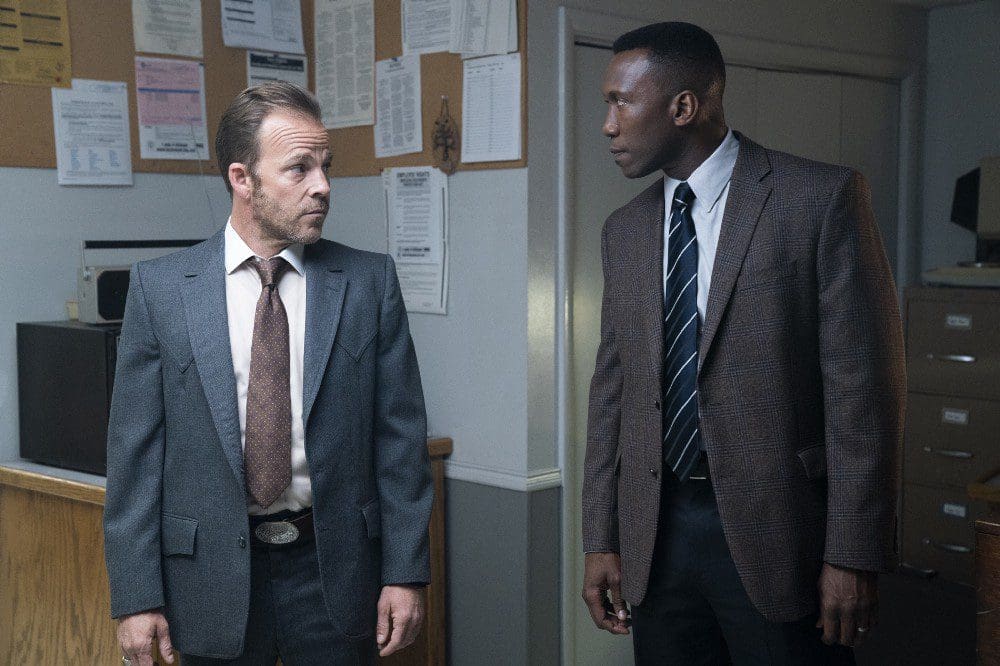
I probably hold the first season of True Detective to an impossibly high standard. There hasn’t been a show since that I’ve watched in a single sitting. The first three episodes of the third season have not meet that standard as its hooks only came at the end of each episode, not through the banter between detectives or existential crisis.
Creator Nic Pizzolatto steps in behind the camera for the first time with ‘The Hour and the Day,’ and brings this season close to the standard set five years ago. This is not to say Pizzolatto has reached the level of first season helmer Cary Fukunaga on his first go behind the camera. No, he’s only starting to find a strong footing. Though, sequences like the Vietnam nightmare of Wayne Hays (Mahershala Ali) and a ride along with Roland West (Stephen Dorff) and Tom Purcell (Scoot McNairy) show potential.
Most of the improvements come from the overall development of the episode which hardly feels like its title. At least part of that success has to stem from co-writer David Milch, creator of Deadwood, as this is the first episode without Pizzolatto as the sole writer.
Not only did Milch create one of the century’s greatest shows but if anyone knows the anatomy of procedurals, it’s Milch who got his start writing for Hill Street Blues and later created NYPD Blue.
If it wasn’t a conscious effort, it’s at least appreciated that they’re not trying to parallel the success of Season One. The banter between Ali and Dorff is not making waves, nor is the multi-level questioning in the future. No one is going to touch Rust Cohle’s fits of rage and existentialism.
Supporting characters start to slide into the driver’s seat while Hays is still at the center. Each of the three timelines shows Hays with different weaknesses that are always revolving around his work (or past work). But the split timelines also reveal more about the rest of the ensemble. Perhaps the most intriguing relationship is between Roland and Tom — Dorff’s detective and victim’s parent (Scoot McNairy). It’s certainly the most illuminating, showing a softer side to Roland and fear in place of Tom’s contempt for the world around him. This only exists between the two of them, as does the prejudice of the town between one of the perps and the whole town looking for an easy scapegoat.
The success of the episode doesn’t rely on any reveal in the search for the missing child. Nor does it rely on anything grotesque that preys on its audience’s morbid curiosity. Instead, it’s entirely character-driven and in place of violence and sex, Pizzolatto opts for reactions.
Whereas Season One would gladly show what goes on in the bedroom after Hays has an argument about his responsibility with Amelia (Carmen Ejojo), he leaves the camera with the kids in the living room. The same goes with the closing scene. Instead of a big explosion where the MAGA-equivalent mob chasing Brett Woodard, we’re treated to credits.
Similarly, there’s good reason for the multiple timelines. It’s becoming clear this isn’t a simple framing device as before: it’s a coping mechanism for Hays. Each level of the timeline he has to deal with his past. The main timeline has him coping with his time in Vietnam. The second tier has developed into his struggle with the investigation and family. Now the third level has elements of all of the above but with the exception that he literally enlists someone to help remedy all that came before in the form of Sarah Gadon’s TV personality researching his investigation.
The success of the episode is almost entirely because of these reactions and introspective moments. There a number of notable quips like Hays’ sharp response to another black man questioning how he can work as the police, but those take a backseat to lush development. This isn’t going to be a cultural phenomenon as the first season was, instead, it’s carving its own unique path so long as the episodes stay engaged beyond telling us to come back each week for another little clue.
Overall Grade: 9 out of 10

